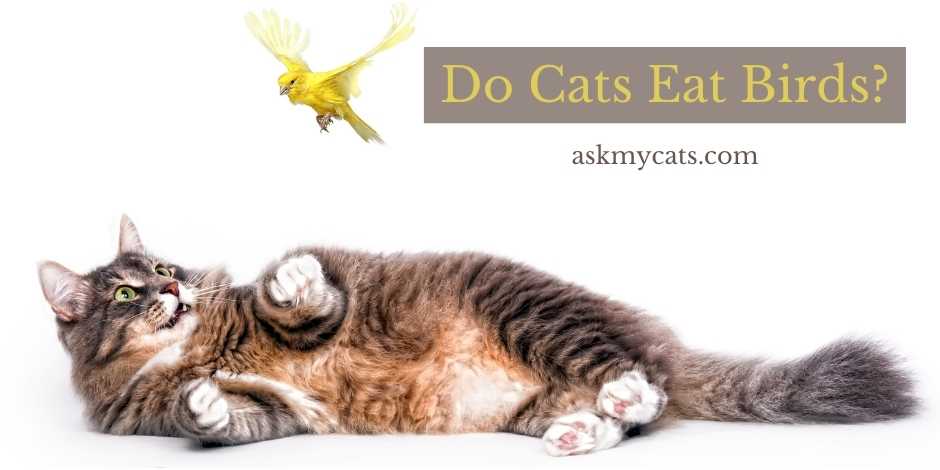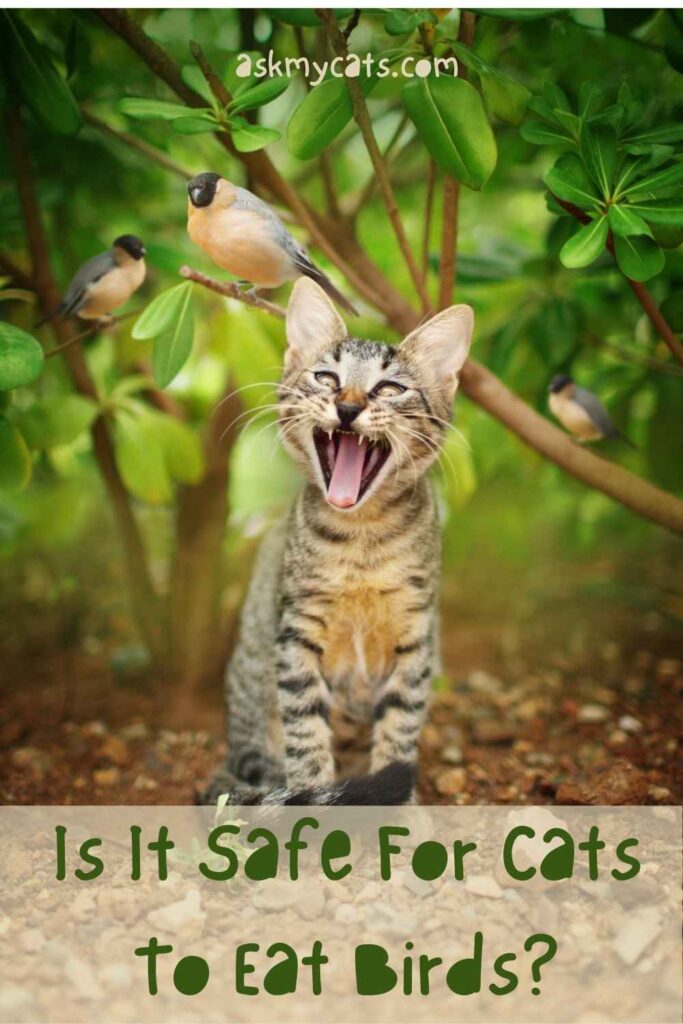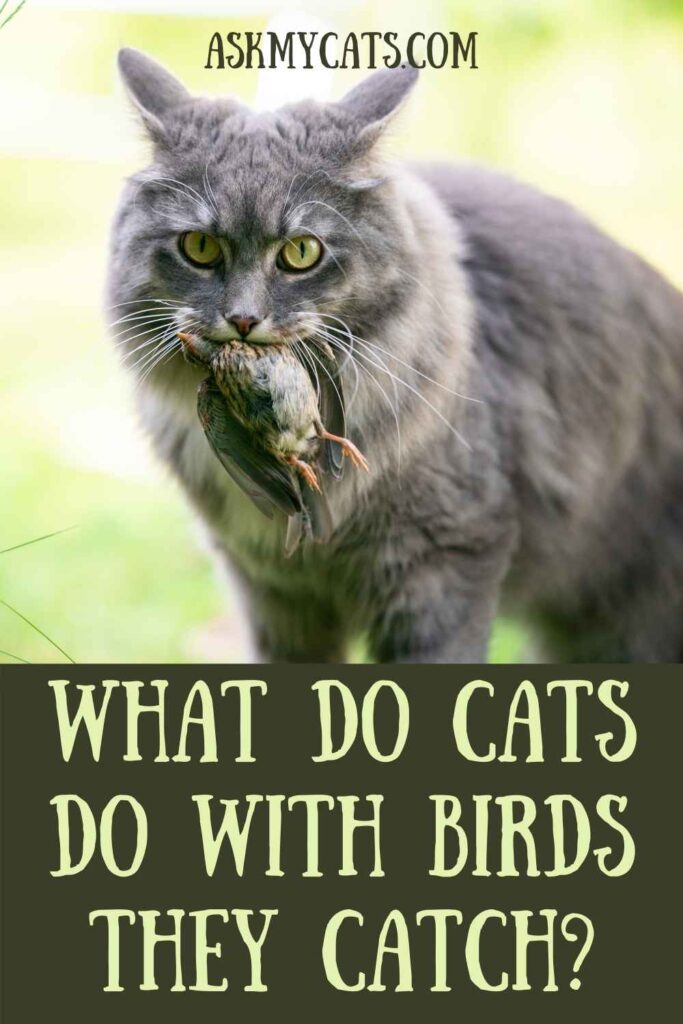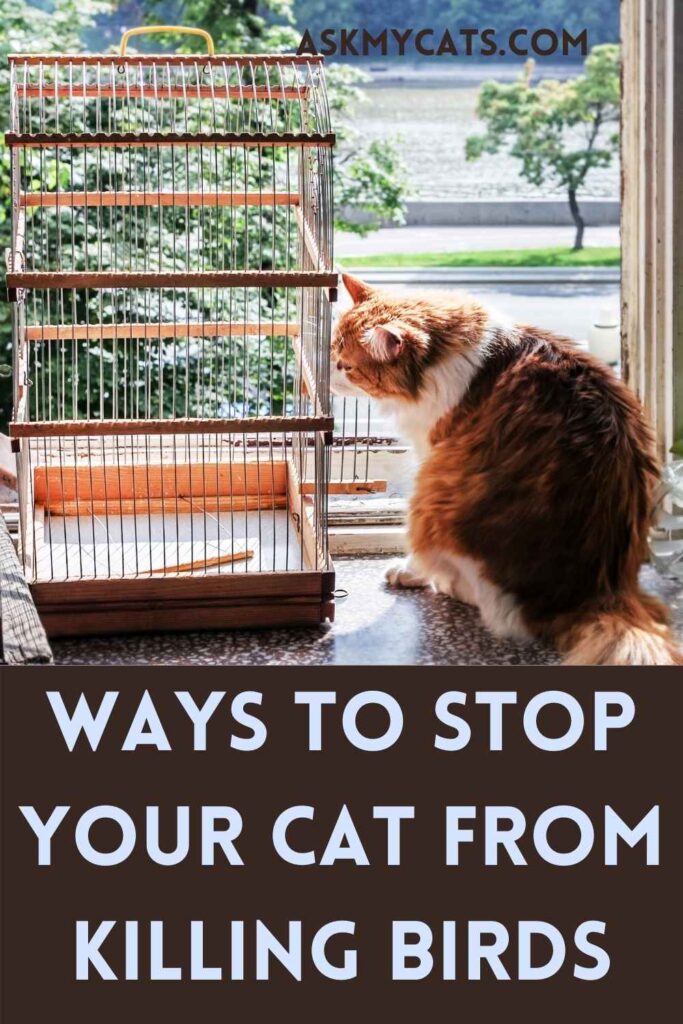Cats and birds are both natural predators and prey. Outdoor cats, and even house cats, may stalk and pounce on birds if given the opportunity, as portrayed in cartoons. These are instinctive actions.
Cats do consume birds. Cats live as obligate carnivores by hunting for meat, and birds are definitely on the menu. Many cats, though, will hunt and kill birds without ever eating them.
In some situations, cats appear to love the hunt even if they do not require a food. Can pet birds and house cats transcend their inherent impulses in order to coexist?


Give Your Cat the Perfect Day
Get the Free Ebook!
Do Cats Eat Birds Or Just Kill Them?
Cats can kill the birds and then they will also eat them because cats are natural hunters and they get nutrition from meat based diet mainly.
Cats are obligate carnivores, which mean they can only thrive on a meat-based diet. Their digestive systems aren’t designed for a vegan diet, and they can’t acquire all of the nutrients they need without consuming meat.
Because birds aren’t veggies, they’re ideal for cats to consume. Certain species are also tiny, making them simpler prey to catch, transport, and consume whole. Birds, on the other hand, can be difficult to capture, therefore they may not be the best choice for cats.
Rodents were the most prevalent prey in both urban and rural contexts, although shrews and reptiles were killed by cats more frequently in rural areas, while birds (mostly sparrows and pigeons) were killed more frequently in urban areas.
Domestic cat predation is the most significant direct human-caused danger to birds in the United States and Canada.
Outdoor cats kill over 2.4 billion birds each year in the United States alone. This figure may appear incredible, yet it reflects the effect of tens of millions of outdoor cats. Every outdoor cat has a role to fulfil.
The study also discovered that a cat’s choice of prey varied based on the seasons and the availability of certain prey in its area. While birds are notoriously difficult to catch, cats typically seek them around June, when their number is at its peak.
Cats will frequently not only hunt but also devour birds. However, this isn’t always the case, so let’s look at how our feline friends hunt.
Aside from tiny animals like hamsters, rodents, and rabbits, domestic cats consume birds since it is one of their preferred preys. Despite being domesticated, they have an inclination to hunt for prey.
Cats are attracted to the motions of birds, which is one of the reasons they prefer to hunt and consume them. Except for the gizzard, big bones, and feathers, cats will eat most parts of birds.
Is It Safe For Cats To Eat Birds?
Yes, eating a bird is quite safe and natural for a cat, especially when compared to rodents; however birds can potentially transmit illnesses that can make your cat unwell. Birds can irritate or harm their stomachs if they eat them.
Cats who hunt and eat birds on a regular basis may endure vomiting, fever, and weight loss. If this occurs, take her to the veterinarian right once for an assessment and treatment.
Infected birds can also transmit parasites to cats, both inside and externally. Roundworms and tapeworms are common worms in birds that can infect cats.
Songbird fever may also affect cats. Salmonella, a kind of bacterium that is a major source of food-related diseases, causes this ailment, which is quite common in the United States.
Salmonella is present in the US avian population and can cause large-scale illnesses on occasion. It is easily transferred by touch and is prevalent among birds that visit gardens with bird feeders and food.

1. Stomach Upsets
Some cats are fussy and cautious eaters, while others will eat anything.
Because birds aren’t all flesh and have feathers and tiny bones all over their bodies, they might pose a health risk to your cat, especially if you don’t shoot often.
Domestic cats may have difficulty eating and digesting a whole chicken, which is reasonable.
If your cat is vomiting, having diarrhoea, being restless, drooling, or gagging regardless of what they ate, a trip to the veterinarian cannot only relieve their discomfort but possibly save their lives if their condition is critical.
2. Food Poisoning
As previously stated, cats that are not accustomed to eating birds or other wildlife may be at risk of contracting food poisoning. It may be because this is their first time eating this new cuisine, or it could be something more severe.
While you may be certain of your cat’s health, you have no way of knowing how the bird was when your cat captured it or even discovered it. A domestic cat may have missed these alarming indications if the bird was wounded, weak, or sick.
A bird might also be carrying a high quantity of bacteria that is causing your cat’s stomach bug symptoms, such as vomiting, regurgitation, diarrhea, and weakness, to mention a few. All of them are significant enough to warrant a visit to the veterinarian for your cat!
3. Microorganisms
Another reason why your cat shouldn’t eat a bird they recently caught is the risk of being very ill. Internal and external parasites in birds can be transferred to cats, with roundworms, tapeworms, fleas, ticks, and mites being the most prevalent examples.
According to research on birds in urban areas, sparrows were the most infected birds (52.4 percent), and their tiny size makes them ideal for catching and infecting your feline pet.
Even if a worm infection isn’t life threatening, a parasite-fighting, prevention, and control treatment is necessary to keep your cat safe. Your veterinarian is the ideal person to ask for advice on such treatment, which will be tailored to your cat’s lifestyle and weight.
Whether your cat ate a bird or raw meat, keep a watch on them. Because cats can carry this illness without exhibiting symptoms, cleaning your hands after touching your cat, not kissing your cat, and allowing your cat to lick your face are all important precautions to take.
Is It Good For Indoor Cats To Watch Birds?
Yes, indoor cats may benefit from bird watching. For cats, it’s a fun, engaging, and exciting activity and hobby.
By installing a bird feeder outside the window where she normally hangs out, you may allow your cat to view and study birds without harming them.
You may let your cat view movies of birds on your computer if you don’t have large windows or live in a high-rise building.
If you hear your cat chattering while observing birds, don’t be alarmed; this is a common behaviour when cats see their prey.
It’s also a cat’s method of releasing pent-up frustrations, according to cat behaviourists, because they can’t capture the prey beyond their grasp.
What Do Cats Do With Birds They Catch?
It’s game over if the cat manages to harm the bird. Before completing the final kill, the cat may occasionally play with it, swiping at it and stalking it.

A bigger bird, such as a duck, may be able to keep a cat at bay for a while, but a determined feline will finally wear it down and kill it.
Cats are clever animals, and they may occasionally stake out an area where there are a lot of birds. Cats, for example, may occasionally crouch beneath bird feeders, waiting for prey to arrive.
To begin, the cat will stalk its victim. It will lower down to the ground and keep an eye on the bird. The cat will usually attack the bird in short, rapid motions with breaks in between.
The bird will flee if it spots the cat. However, if the cat is swift and lucky, the bird will not see it approaching.
When the cat comes close enough, it will jump on the bird, aiming a swipe of its paw. Although birds are swift in the air, they are not always able to take off quickly enough to evade a cat.
Cats have a reputation for being opportunistic hunters. Birds, mice, rats, and other small vertebrates are among the animals they will consume.
Cats, on the whole, have an easier job capturing rodents than birds. Cats in the suburbs and even many cities, on the other hand, don’t have much of an opportunity to hunt rodents.
Small rats have nothing to eat outside, so people try to keep them out of their homes as much as possible. As a result, domestic cats prefer to hunt birds, despite the fact that they are more difficult to catch.
Can Birds Make Cats Sick?
Yes, cats can get avian influenza, although their chances of getting the disease all over the world are now considered very low.
Domestic and feral cats have decimated urban bird populations. If your cat consumes the birds it catches, there’s a risk he or she will have stomach problems (vomiting and diarrhoea).
Birds do not provide the same health hazards as rodents, but they are not an ideal dietary source.
It may be difficult to keep your cat from hunting outside if he or she is a hunter. You might be able to stop the cat from devouring the prey if you catch it in the act.
If you try to stop your cat from eating this meal, be careful; these small predators may attack you in order to protect their prize. Make sure your cat is up to date on vaccinations and parasite prevention if you know he or she enjoys hunting.
Please phone the clinic if you have any questions about your pet’s health. Our team would be delighted to help you.
Ways to Stop Your Cat From Killing Birds
It’s critical to keep yourself, your cat, and the local bird population happy by preventing your fluffy buddy from killing them or any other animal in your neighborhood.
It can be a challenging process, especially for owners whose cats have spent most of their lives outside, but it is certainly doable.

1. Overfeeding
Feral cats who don’t have constant access to food will go out of their way to find food, and they may spend the entire day hunting for prey.
While your house cat’s hunting behaviour isn’t entirely motivated by hunger, small changes in their diet can reduce the number of hours they spend hunting each day.
The introduction of a premium commercial meal containing meat proteins reduced the number of prey animals cats brought home by 36%, and five to ten minutes of daily play with an owner reduced the number of prey animals cats brought home by 25%.
Of course, overfeeding your cat is never a good idea, but choosing a cat food brand they like that has a lot of meat and the right nutrients might keep them interested.
Small amounts throughout the day and night may also assist to replicate their normal eating habits, and an automated cat food feeder may be ideal for cat owners who must be away from home for lengthy periods of time.
2. Restrict Their Movements
Changing your cat’s eating schedule and play activities will help them stop killing birds, but the most effective approach to keep them safe is to make a permanent outdoor to indoor transition.
This significant shift in your cat’s life and surroundings may have a significant impact on their health, so keeping them inside isn’t a good idea either.
Many cats will adjust with minimal effort, but others will be miserable—and let you know it. They could scratch, claw, yowl, and try to run through open doors.
3. No Hunting!
We shouldn’t try to modify a cat’s natural hunting instincts; instead, we can substitute a genuine bird with a toy bird.
As owners, we are responsible not just for our cats’ food consumption, but also for their general surroundings and requirements, and by playing with them, we are satisfying their inner desire to hunt.
You may effectively activate their predatory behaviour, improve their engagement, and make them have fun by increasing the amount of time you spend playing with your cat and figuring out what truly gets them happy!
Frequently Asked Questions
What kind of birds do cats eat?
Cats kill common birds like the Cardinal and Blue Jay, as well as rare and endangered birds like the Piping Plover, Florida Scrub-Jay, and California Least Tern. In the United States, there are about 77 million pet cats.
Do cats catch birds at night?
Cats are crepuscular, not genuine nocturnal creatures. Cats are natural hunters, and those are the times of day when they have the best chance of seeing prey. Even though most domestic cats have outgrown the need to hunt for food, they still have the instinct to wander and prowl at night.
Do cats eat bird’s heads?
Yes, my cat would only eat the heads of birds, mice, rats, new-born rabbits (without the ears), and squirrels. It’s because they’re leaving the remainder for you as a gift.
Final Words
Cats are natural predators, and if given the opportunity and access to the outdoors, cats will hunt and kill prey such as birds.
Cats that eat a single bird are unlikely to get disease or parasites, but if they do so frequently, they are at risk of contracting disease and parasites.
Feel free to ask your questions in the comments section below!
